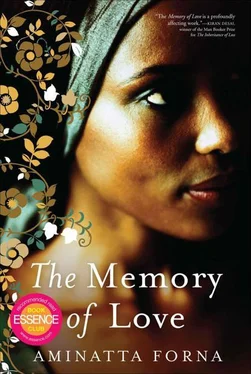‘I’m sorry,’ she says. And shakes her head.
‘Are you all right?’
‘Nina. She was hit by a car. The bastard didn’t even stop. She managed to crawl almost all the way home. She died outside the house.’
‘Oh, Ileana. I’m sorry.’
‘I’ve never told anyone else this, but when I worked at the mental hospital in Bucharest a patient was admitted one evening straight from the medical hospital. At the staff meeting the next day she was allocated to me. Apparently everybody else had a full caseload. I was delighted. I still only saw patients under supervision. I was desperate for a real case.
‘She was young. Maybe a couple of years younger than me. She was on suicide watch. I mean, this was a long way off teaching inmates to make string bags and tea towels. I took it as a sign my supervisor had faith in me.’ Ileana sets a pot of tea down on the desk along with the two flowered bone china cups and a box of sugar cubes. ‘They had her on the full dose of drugs. Early on I fought to have her regime reduced. After that she started making progress. She was smart, educated. In another place she could have been my friend. Sugar?’
Adrian shakes his head.
‘When I came back she wasn’t there. She’d been transferred. Without any reference to me. Gone. They’d already given her bed to somebody else.’
‘Christ!’ said Adrian. ‘What was that about?’
‘I’d been set up. She was a political detainee. From us she was transferred to a high-security psychiatric hospital, where she was diagnosed paranoiac. Everyone in the country knew what was happening but pretended everything was perfectly normal. The ones who couldn’t keep up the pretence we locked away.’ She laughs and Adrian smiles. Ileana raises her tea cup. ‘To Nina. Snappy little bitch, soul of a stray. Bit me more than once. I found her on the beach, did I ever tell you that? Seduced her with tinned salmon.’ She sighs. ‘I loved her.’
‘To Nina,’ Adrian concurs. The tea burns the roof of his mouth. He asks, ‘Is that why you left Bucharest?’
‘More or less. The fact is, soon after I didn’t have a job. None of us did.’
‘How?’
‘Ceau  escu decided we were collaborators with Western spy agencies. He sent a lot of people to prison. Banned the entire profession from practising.’
escu decided we were collaborators with Western spy agencies. He sent a lot of people to prison. Banned the entire profession from practising.’
‘But not you?’
‘I was too junior. I didn’t matter.’
‘So what did you do?’
‘I went to work as a cleaner until my family could emigrate. We dug up a Jewish grandmother, actually a dead step-grandmother. We used her to emigrate to Israel.’ She raises her cup again. ‘A toast to her, too. Whoever she was.’
‘Have you been back since? To Bucharest?’
‘Once. That was enough.’
He is quiet. She lights another cigarette and disappears briefly behind the smokescreen. ‘My family, the ones who still lived there, they didn’t want to talk about the past. All they wanted were watches, TVs, video recorders. Not one of them raised a finger to help after I lost my job. Fuck this! Come on!’ She grinds out the stub of her cigarette into a saucer and slides the handle of her handbag off the back of the chair. ‘Let’s get out of here. I’ll buy you a drink. In fact, I’ll do better. I’ll buy you tomorrow’s hangover.’
Somehow, not before they have been to a couple of the bars along the way, they wind up at the Ruby Rooms. As soon as he enters, Adrian realises why the name seemed so familiar. The booths, the wine-coloured carpet and compact dance floor, the terrace overlooking the hills, the place is just as Elias Cole described it in their conversations, from a time when it was called the Talk of the Town.
Ileana is at the bar ordering drinks. Shouting Romanian-accented Creole at the barman above the din. He cannot imagine Lisa acting like that, or even agreeing to come to a place like this. The bass beat pounds through Adrian’s guts. There are people on the dance floor, dark shapes, their edges illuminated by the strobe light. A DJ, trapped like a bird in a tiny booth above the dancers, announces each new song. Smells of sweat, beer and dry ice. He catches Ileana’s eye, mouths to her at the same time as pointing to the door. She nods back. Outside on the terrace he finds a table, wet with beer, a couple of plastic chairs. Up this high there is a breeze. The music has settled to a more bearable level. He watches Ileana as she comes towards him carrying the drinks. In her high-necked floral blouse, white socks and sandals, she could scarcely look more incongruous.
As Adrian watches a tall, good-looking man in baggy jeans and an oversize T-shirt peels away from a wall and intercepts her, keeping pace with her as she walks. From what Adrian can make out he appears to be saying something to her under his breath. Ileana responds without breaking her stride. The young man stops dead in his tracks and stares at her with his mouth open. Then he draws back his chin, sucks his teeth so loudly even Adrian can hear it, turns on his heel and rejoins his companions. Adrian rises to help Ileana with the drinks.
‘What was that about?’
‘He offered to pleasure me. Apparently his cock is enormous. Can you believe it?’
Adrian can’t quite, in fact. The young man can’t be much past his twenties, if that. ‘What was it you said to him?’
‘I told him no thanks. But to come back when he could lick his eyebrows. Noroc! ’ She raises her glass of Jack Daniels.
Adrian, who has already taken a sip of his drink, nearly chokes.
Inside the music has quieted. People are leaving the verandah, moving back inside, in ones and twos.
‘They must be starting,’ he says. He feels nervous with anticipation.
They leave the table and follow the other guests inside. For the first time Adrian notices a small stage at the back of the room. Musical instruments. Drums. A guitar leaning on a chair. A clarinet. The DJ is speaking into the microphone. Adrian can’t make out what he is saying, only the drama in the man’s voice. Around Adrian people begin to clap. Three men and a woman come on to the stage. It is her. Adrian closes his lips, misses a breath, and inhales deeply with the next. A dress, of the same print as the men’s shirts, is wrapped around her body. Her shoulders are bare, her hair pulled back from her face. She doesn’t go to the microphone stand, as he expects, but crosses the stage and picks up the clarinet. One of the group steps forward to the microphone and begins to hum ascending notes. The sound is immense, reverberating through the density of bodies. Minutes, it seems, pass. The sound grows louder. Then enters the clarinet. Finally the guitar and the keyboard. But it is the clarinet, so close in sound to the human voice, that rises above the others. The man in the lead shifts his footing to lean closer in to the microphone and begins to sing. Afterwards Adrian would struggle to describe to himself the sort of music it was, whether jazz or soul, only the mood of it. It slows his heartbeat, his spirit is lifted and carried along on it, only to be set down and lifted again. Nobody dances, just listens. As each song finishes the sound of the last chord hangs in the air above the heads of the audience, is dispelled only by the sound of clapping. The band moves from one song to the next. Three songs in all. He watches her throughout, the sharp point of her elbow, the movement of her wrists and fingers, the way she rests the mouthpiece on her lower lip. Her playing is unostentatious, devoid of showmanship, she does not close her eyes or sway. Just the heel of a foot counting beats upon the wooden floor. From time to time she lifts her eyes and casts an appraising look over the crowd. Once she sees him, he thinks, and seems to smile. The singer leans into the microphone again, murmurs several thank yous, introduces the band one by one. There is clapping and whistling at each name. She holds her clarinet across her body. When her cue comes she raises the mouthpiece to her lips and plays a few notes of a solo. Three songs more. And then it is over. People drift back outside. The band leave. The instruments remain on the stage.
Читать дальше

 escu decided we were collaborators with Western spy agencies. He sent a lot of people to prison. Banned the entire profession from practising.’
escu decided we were collaborators with Western spy agencies. He sent a lot of people to prison. Banned the entire profession from practising.’










